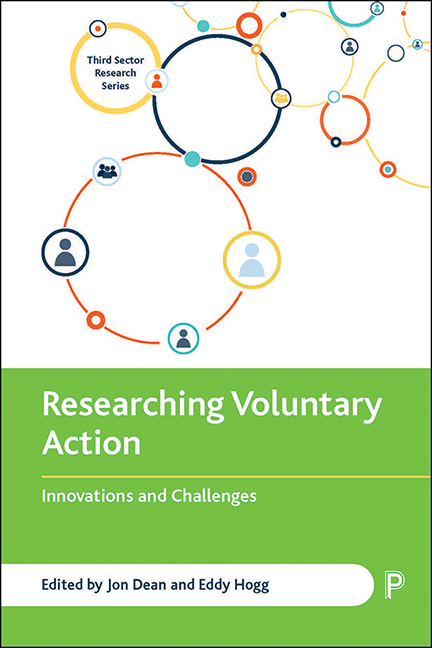Book contents
- Frontmatter
- Contents
- List of figures, tables and boxes
- Notes on contributors
- Acknowledgements
- Series editor’s foreword
- 1 Introduction
- 2 (Un)suitable methods and reflexive considerations: an interview and focus group study of youth volunteering
- 3 Interpretive ethnography: a UK charity shop case study
- 4 Collaborative philanthropy and doing practically relevant, critical research
- 5 Peer research: co-producing research within the context of voluntary and community action
- 6 Charity advertising: visual methods, images and elicitation
- 7 Using archives and objects in voluntary action research
- 8 Using Mass Observation as a source of qualitative secondary data for interdisciplinary longitudinal research on voluntary action
- 9 Investigating meanings and messages on volunteering through television media
- 10 Annual reporting in voluntary organisations: opportunities for content analysis research
- 11 Researching risk in the voluntary sector: the challenges and opportunities of regulatory data
- 12 Exploring the benefits of volunteering: combining survey and administrative data in the Nordic ‘laboratory’
- 13 Spatial approaches to the voluntary sector
- 14 Restudies, surveys and what counts as volunteering
- 15 Conclusion
- References
- Index
Series editor’s foreword
Published online by Cambridge University Press: 15 September 2022
- Frontmatter
- Contents
- List of figures, tables and boxes
- Notes on contributors
- Acknowledgements
- Series editor’s foreword
- 1 Introduction
- 2 (Un)suitable methods and reflexive considerations: an interview and focus group study of youth volunteering
- 3 Interpretive ethnography: a UK charity shop case study
- 4 Collaborative philanthropy and doing practically relevant, critical research
- 5 Peer research: co-producing research within the context of voluntary and community action
- 6 Charity advertising: visual methods, images and elicitation
- 7 Using archives and objects in voluntary action research
- 8 Using Mass Observation as a source of qualitative secondary data for interdisciplinary longitudinal research on voluntary action
- 9 Investigating meanings and messages on volunteering through television media
- 10 Annual reporting in voluntary organisations: opportunities for content analysis research
- 11 Researching risk in the voluntary sector: the challenges and opportunities of regulatory data
- 12 Exploring the benefits of volunteering: combining survey and administrative data in the Nordic ‘laboratory’
- 13 Spatial approaches to the voluntary sector
- 14 Restudies, surveys and what counts as volunteering
- 15 Conclusion
- References
- Index
Summary
The world of voluntary action is a complex one. Scholars in the field study actions by individuals that are not reducible to considerations of financial return or personal gain, and organisations that occupy hybrid spaces in the interstices between communities, markets and states. We may expect relatively straightforward results from commercial or statutory organisations – goods supplied at market prices to those who can pay for them, or services delivered on a consistent basis to those in need of them. What we expect of voluntary organisations is much less clear: we expect them to provide direct benefits, certainly, but also latent and indirect ones in the form of benefits to society such as the promotion of social capital within communities. As Hogg and Dean observe, voluntary action is a difficult and complex field to investigate, straddling as it does the public and private spheres. It is therefore a field with a need for robust research that will offer clear and grounded insights.
Yet the field is one that to date has lacked a volume that brings together in one place a range of contributions from scholars researching voluntary action. That is the aim of the present edited collection. The chapters exemplify important challenges: the disjunctures between the academic and the common sense of everyday meanings of voluntary action by individuals; the complexities of relationships between researcher and researched, in situations in which individuals may have little to gain directly from participation; the need to give voice to research participants while at the same time not resorting to uncritical, hagiographic accounts of individuals struggling against impossible odds.
Given the diversity of voluntary action and of the settings in which it takes place, the diversity of sources and methods within this collection is a key theme. The studies encompass combinations of survey and administrative data, regulatory returns and text from annual reports, visual methods, participant observation, archives and autobiographical accounts by individuals. The topics themselves are also highly diverse but they are united by a shared concern with private action for the public good. The relationships that this entails, the meanings that people attach to their actions and the expectations that society invests in voluntary action are complex, and they impose a requirement for contextually specific, sensitive and appropriate research methods.
- Type
- Chapter
- Information
- Researching Voluntary ActionInnovations and Challenges, pp. x - xiiPublisher: Bristol University PressPrint publication year: 2022



